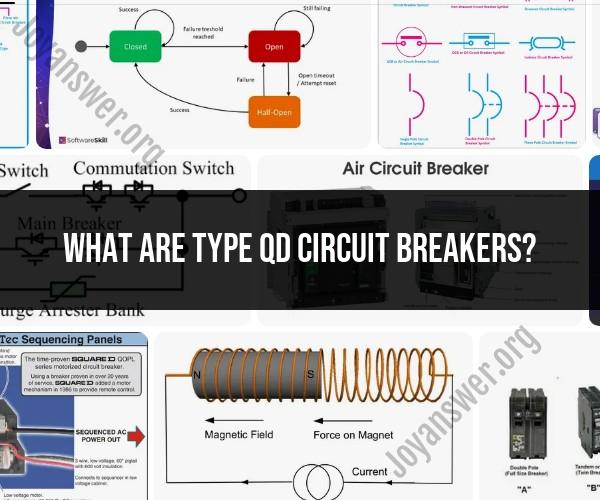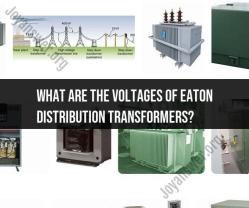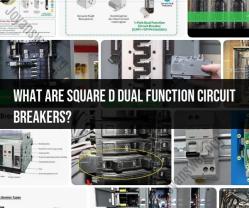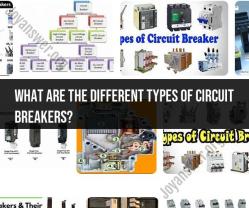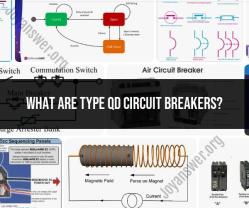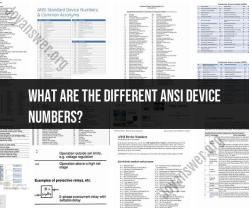What are type QD circuit breakers?
Type QD circuit breakers are a specific type of circuit protection device used in electrical distribution panels and load centers. These breakers are designed to provide overcurrent protection and can be used in residential, commercial, and industrial electrical systems. Here are some key features and uses of Type QD circuit breakers:
Quick Disconnect (QD) Feature: The "QD" in Type QD stands for "Quick Disconnect," which means these circuit breakers are equipped with a unique feature that allows for faster and easier removal and replacement of the breaker without the need for special tools. This can be particularly useful during maintenance or troubleshooting.
Thermal-Magnetic Operation: Type QD circuit breakers typically use a combination of thermal and magnetic mechanisms to provide protection. The thermal element responds to overloads (sustained high current), while the magnetic element responds to short-circuit currents (rapid surges in current). This dual protection mechanism helps safeguard electrical circuits and equipment.
Variety of Amp Ratings: Type QD circuit breakers come in various amp ratings to accommodate different electrical loads. Common amp ratings range from 15 amps to 100 amps, making them suitable for a wide range of applications.
Compatibility: Type QD circuit breakers are designed to be compatible with specific brands and models of load centers and panelboards. It's essential to ensure that the breaker you select is compatible with the electrical panel in which it will be installed.
Applications: Type QD circuit breakers are commonly used in residential and commercial settings to protect branch circuits, such as those powering lighting, outlets, appliances, and other electrical devices. They can also be used in industrial environments for similar purposes.
Certifications: It's important to ensure that Type QD circuit breakers meet safety and performance standards. Many reputable manufacturers produce circuit breakers that are UL (Underwriters Laboratories) listed or certified by other recognized testing organizations.
Arc Fault Circuit Interrupter (AFCI) and Ground Fault Circuit Interrupter (GFCI) Versions: Some Type QD circuit breakers are available with integrated AFCI or GFCI protection. AFCI breakers are designed to detect and mitigate arc faults, while GFCI breakers protect against ground faults, which can be potentially dangerous.
When working with electrical systems, it's crucial to follow all safety guidelines, use the right type of circuit breaker for your specific application, and have any installation or maintenance performed by a qualified electrician. Additionally, be aware of local electrical codes and regulations, which may dictate the use of certain types of circuit breakers in specific applications to ensure the safety of the electrical system and its users.
A Closer Look at Type QD Circuit Breakers
Type QD circuit breakers are a type of electrical safety device that is used to protect electrical circuits from overloads and short circuits. They are designed to be used in Square D QO load centers. Type QD circuit breakers are available in a variety of amperage and voltage ratings, and they can be used to protect both residential and commercial electrical circuits.
Type QD circuit breakers are similar to other types of circuit breakers in that they have a trip mechanism that is activated when the circuit is overloaded or there is a short circuit. However, Type QD circuit breakers have a few unique features, including:
- A higher interrupt rating than other types of circuit breakers. This means that they can handle more electrical current without tripping.
- A wider range of amperage and voltage ratings. This makes them more versatile and suitable for a wider range of applications.
- A design that is compatible with Square D QO load centers.
Understanding Circuit Breaker Types and Their Designations
There are many different types of circuit breakers available, each with its own unique design and features. The type of circuit breaker that is right for you will depend on a number of factors, including the type of electrical circuit you are protecting, the amperage and voltage rating of the circuit, and the specific features you need.
Some of the most common types of circuit breakers include:
- Standard circuit breakers: These circuit breakers are used to protect general-purpose electrical circuits. They are available in a variety of amperage and voltage ratings.
- Arc-fault circuit interrupters (AFCIs): These circuit breakers are designed to detect and protect against arc faults, which are a type of electrical fault that can cause fires. AFCIs are required by code in certain areas of homes and businesses.
- Ground-fault circuit interrupters (GFCIs): These circuit breakers are designed to protect against ground faults, which are a type of electrical fault that can cause electric shock. GFCIs are required by code in certain areas of homes and businesses, such as kitchens and bathrooms.
- Molded-case circuit breakers: These circuit breakers are used to protect high-amperage electrical circuits, such as those used in industrial and commercial applications.
Circuit breakers are also designated by a letter code, such as Type QD, Type QP, or Type BR. The letter code indicates the type of electrical circuit that the circuit breaker is designed to protect. For example, Type QD circuit breakers are designed to protect residential and commercial electrical circuits, while Type QP circuit breakers are designed to protect general-purpose electrical circuits in homes and businesses.
Applications and Usage of Type QD Circuit Breakers
Type QD circuit breakers can be used to protect a wide range of electrical circuits, including:
- Residential electrical circuits, such as those that power lights, outlets, and appliances.
- Commercial electrical circuits, such as those that power lighting, office equipment, and machinery.
- Industrial electrical circuits, such as those that power motors, compressors, and other high-amperage equipment.
Type QD circuit breakers are also commonly used in applications where a high interrupt rating is required, such as:
- Data centers
- Hospitals
- Industrial facilities
- Commercial buildings
Compatibility and Installation of Type QD Breakers
Type QD circuit breakers are designed to be used in Square D QO load centers. They are not compatible with other types of load centers.
To install a Type QD circuit breaker, simply snap it into place in the load center. Be sure to turn off the power to the load center before installing the circuit breaker.
Resources for Selecting the Right Circuit Breaker Type
There are a number of resources available to help you select the right type of circuit breaker for your needs. Some of these resources include:
- Electricians: A licensed electrician can help you select the right type of circuit breaker for your needs and install it correctly.
- Electrical supply stores: Electrical supply stores can provide you with information on different types of circuit breakers and help you select the right one for your needs.
- Online resources: There are a number of online resources that can provide you with information on different types of circuit breakers and help you select the right one for your needs.
When selecting a circuit breaker, it is important to consider the following factors:
- The type of electrical circuit you are protecting
- The amperage and voltage rating of the circuit
- The specific features you need, such as arc-fault protection or ground-fault protection
- The compatibility of the circuit breaker with your load center
If you are unsure of which type of circuit breaker is right for you, it is best to consult with a licensed electrician.
